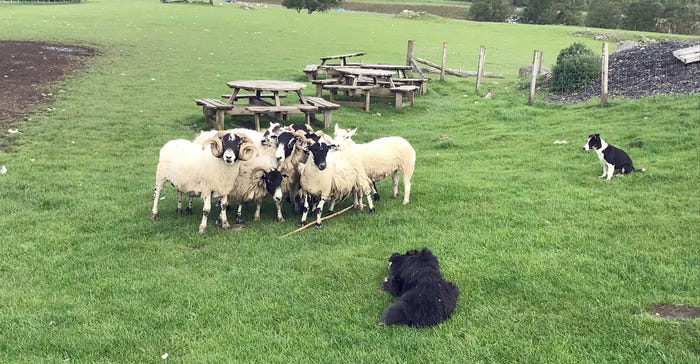
Border collies keep sheep in place on a Scottish Highlands.farm.Ron Smith
Third-generation shepherd Neil Ross addressed a group of tourists on a cool, blustery early June day in the Scottish Highlands. Canadian, Australian and American visitors donned hats, hoods and pulled lightweight jackets a bit tighter as intermittent, icy rain showers swept across the pasture.
Ross, unperturbed, explained in a barely understandable Scotch drawl some of the challenges facing sheep farms in this starkly beautiful landscape.
He cited challenges that an American farmer or rancher would understand — misinformed public, burdensome regulations and extreme environmentalists who don’t understand agriculture.
He laments the decline of the sheep industry in the Scottish Highlands.
“At one time, we had 60,000 sheep here and many more shepherds,” he said. “Now, we have 6,000 sheep and two shepherds.
“I blame misinformed environmentalists,” he said. He explained that sheep, managed properly, promote wildlife habitat.
Ticks, for instance, don’t thrive on short vegetation. “Sheep keep grass grazed low and ticks need taller vegetation to survive.”
Ticks detrimental
He said ticks are detrimental to wildlife, especially deer and grouse. Ticks, he said, can kill grouse chicks and infect deer that can carry Lyme disease that infects humans.
“My biggest concern is that environmentalists and society in general do not understand agriculture,” Ross said. He laments the lack of education about agriculture in schools. He praised the United States for organizations like 4-H and FFA. “We have nothing like that here.”
The farm Ross works, 11,000 acres, including livestock — 2500 sheep during the summer months and 22 beef cows plus wildlife — is owned by a Lord of the Manor, who also sells hunting rights for grouse and deer.
Ross manages the sheep. “I work for the lord, but I rarely see him. I am independent. He doesn’t get in my road and I don’t get in his road.
“I own nothing but 18 sheep dogs,” he said. He put some of the dogs through their paces, sending one of his border collies over a knoll, and, out of sight, whistled instructions to separate a sheep and lamb from the flock and bring the rest to him.
Within a few minutes, the dog brought the sheep to the shepherd.
Different sets of whistle notes
Each of the dogs, Ross said, responds to a different set of whistle notes.
He put a 10-week old puppy on the ground and showed how, even at that young age, these border collies understand their jobs. The pup moved behind the small flock of sheep and moved them right, left, up and back, as commanded.
Ross said he has not trained the puppy except for a few simple commands. “It’s born in them,” he said.
The gifts of a shepherd might be inherited as well. Ross’ father and grandfather were shepherds. Ross was born on this farm. He pointed to an abandoned house. “I was born right there,” he said.
“I love this way of life; I love the independence.”
Maybe the tradition will continue. “My daughter, 14, is already a good shepherd,” Ross said. “My son, 12, is good with the dogs. He’s a good shepherd, too, but not as good as his sister.” Another son, 8, “is learning to be a shepherd.”
Ross hopes the region will maintain enough sheep to allow his children to enjoy the independent lifestyle he treasures.
About the Author(s)
You May Also Like






